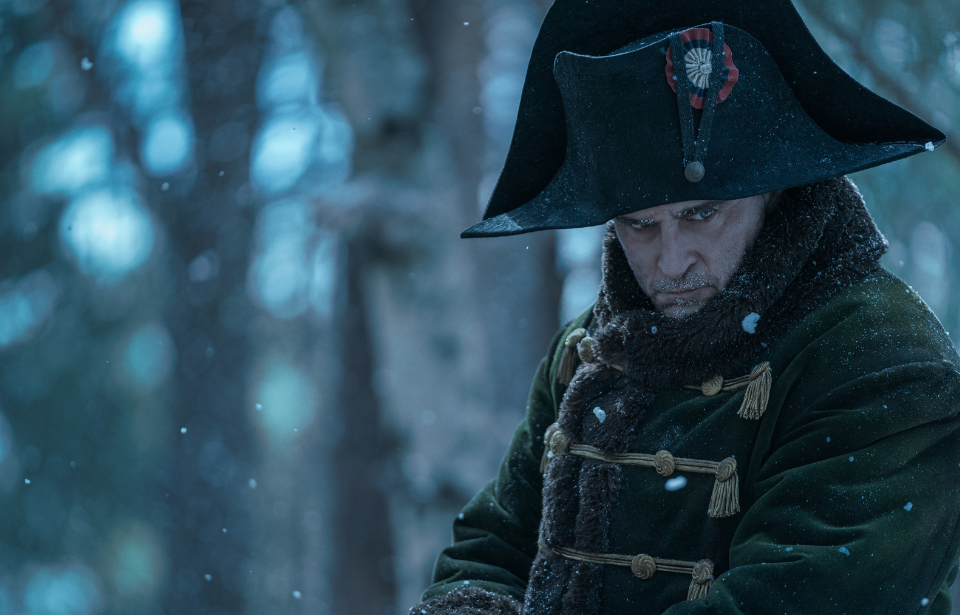Ridley Scott’s Napoleon was one of the most anticipated films of 2023. While many applauded the feature for its cinematography, others criticized it for what it got wrong about that period of history. To discuss the inaccuracies presented by Napoleon and what should have been included, War History Online spoke with Roxanne Panchasi, the Associate Professor of History at Simon Fraser University in British Columbia and host of the New Books in French Studies podcast on New Books Network.
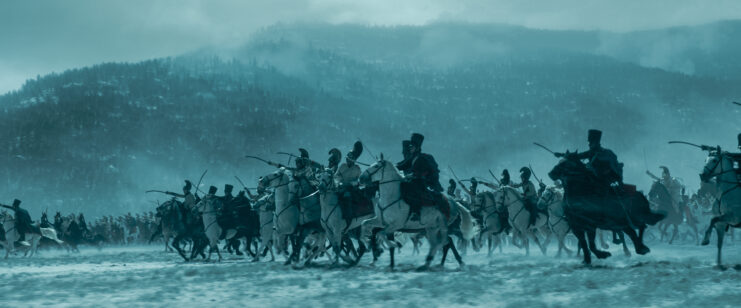
What were one or two inaccuracies you noticed in Napoleon?
ROXANNE PANCHASI: The film is really stunning, [but] it starts with an inaccuracy, which is Napoleon [Bonaparte] witnessing Marie Antoinette‘s execution. There’s all kinds of wrong with how the execution is staged. People are like, “Her hair wasn’t long.” It was famously cut short for her execution. [Napoleon also] wasn’t there. In fact, the battle that’s depicted at another moment in the film was happening at the same time.
When it comes to the battles in the film, it’s certainly true that details are exaggerated or invented. […] The Battle of Austerlitz involved water and ice, but nowhere near on that scale. There are elements of that battle that are lifted from others, and they’re kind of condensed because, even though the film is very battle-heavy, it doesn’t show all of them. It is trying to make an attempt to show some highlights of the Napoleonic Wars and Napoleon’s military conquests.
Ridley Scott’s a filmmaker. I’m a huge fan. I don’t love all of his films, but many of his are some of my favorites. For me, it’s about what’s been given up, what’s lost or what’s maybe put in our minds about Napoleon that has a certain politics or a certain kind of effect on our idea about the past and what that means in the present.
I’m always interested in what’s at stake when it comes to certain inaccuracies for a person who’s interested in re-enactments and the details of [the] placement of soldiers and every little bit of a battle or anything, and when it’s Napoleon, it’s his personal life, the political [implications] and the battles – that’s what people get really invested in.
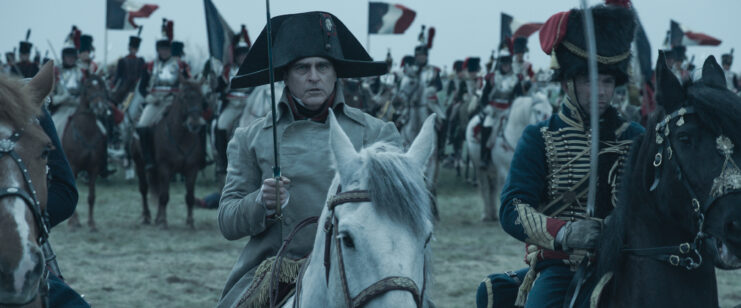
Do you think Ridley Scott could have found a balance between keeping the story engaging and staying true to the historical record?
ROXANNE PANCHASI: I was kind of jazzed about seeing it because of all [the] hype – and I was curious. I like the people who are in the film and, as I said, I’m a fan of Ridley Scott, but my actual experience of watching the film… [I was] pretty impressed by the visuals. Of course, it’s Ridley Scott, things come together quite spectacularly and I think especially during the battle sequences that’s clear.
I kept thinking about the making of the film and kept thinking about the logistics required and the people and the sets and the design, the costumes. All of that was so impressive, so that was one feeling I had.
I laughed a lot; I thought it was quite funny. […] I don’t know how much I was supposed to be laughing. I found Joaquin Phoenix as Napoleon – I like him as an actor [and] I think he’s extremely talented – I just found him completely ridiculous as Napoleon. It didn’t work for me as an audience member and I couldn’t tell [if] this [is] a historian problem I’m having right now or if it’s just a film viewer problem.
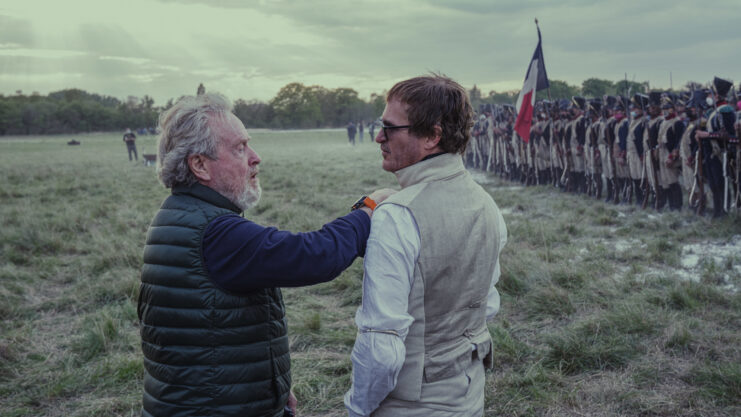
Was there another story about Napoleon and his life that you would have preferred to be told?
ROXANNE PANCHASI: I just didn’t think it was the most interesting story about Napoleon to tell. I feel like, in 2023, I don’t need or want an epic biopic about [him]. I’m a French historian and I didn’t feel the need for that. I’m always asking questions about that.
Why are we telling this type of story? If we’re going to tell a story about that era or the effects of that era, the effects of those brutal wars, the effects of those political shifts, a story about gender and sexuality, marriage and relationships at the highest levels of French or any other society – why are we telling [it]? What are we going to learn from it? For me, the film just didn’t deliver in any interesting way on those levels.
As a French historian, you learn pretty quickly that people who work on Napoleon have a different point of focus [and] you learn pretty quickly that [if] you want to understand 19th-century France, you want to extend [past] the French Revolution, […] 20th-century France and the legacy of Napoleon. You can’t just be thinking [about] and fixating on [him].
Even the battles, I found [them] sort of disappointing. Of course, there were thousands of people involved in all of those scenes and they’re quite spectacular to watch, but the Napoleonic Wars, for me, learning about them or thinking about them from the perspective of a soldier in the armies or from the people affected by the ways entire swaths of Europe were ravaged or reorganized and transformed by the spread of the Napoleonic Army, the conquest and the destruction.
[The fixation] on him as a figure [and] the Napoleonic Wars, for me, became another kind of vehicle to show, create and reinforce this Napoleonic myth. […] What bugs me about the film is that it just kind of added to that story and doesn’t really shed any kind of interesting light on the period [or] the politics.
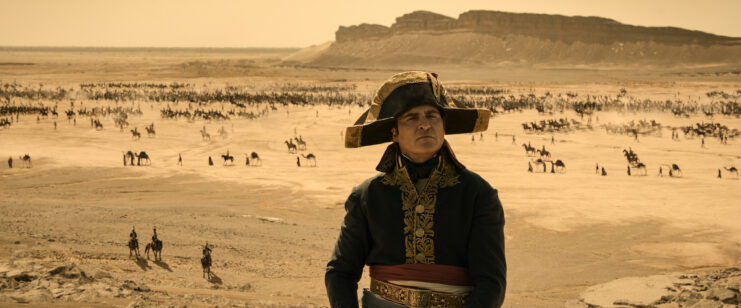
Outside of the inaccuracies, was there anything you felt Napoleon left out?
ROXANNE PANCHASI: There are so many things that are not in the film. People have been very clear about [that] fact.
What we all need, I think, is for us to think really critically about this period. [It’s] a period of vast expansion [for] the French Empire on the backs of slavery. These are things that are going on at this point. […] There’s a whole lot of racial violence and politics that’s not in the film and, in 2023, what I meant when I said I don’t need this film… I just don’t know what we’re doing.
We tell a story. It’s really grand, it costs a lot of money, it involves thousands of people. There are things impressive about it, but, politically, I think it’s kind of a shame and a missed opportunity to tell a story that might change what we understand and know about the past.
What about the letters exchanged between Napoleon and Empress Joséphine?
ROXANNE PANCHASI: When it comes to the relationship, which is the place where people think something interesting is going on when they see the film and appreciate that part of it, I think there was a missed opportunity.
The thing that I liked about the film was how much emphasis it put on Napoleon and Joséphine’s letters in that period and how important they were to that period, and it works as a kind of arc and a kind of anchoring throughout. There’s a letter and that’s how you know time is passing; that’s how you know what’s going on between characters who might be far apart from each other.
It [has] strategic value and drives the narrative along. […] I saw something promising there, but even in the terms of their relationship, I was disappointed. I found it quite comical. The scenes [where] they were interacting, [I] wasn’t swept up in their romance at all.
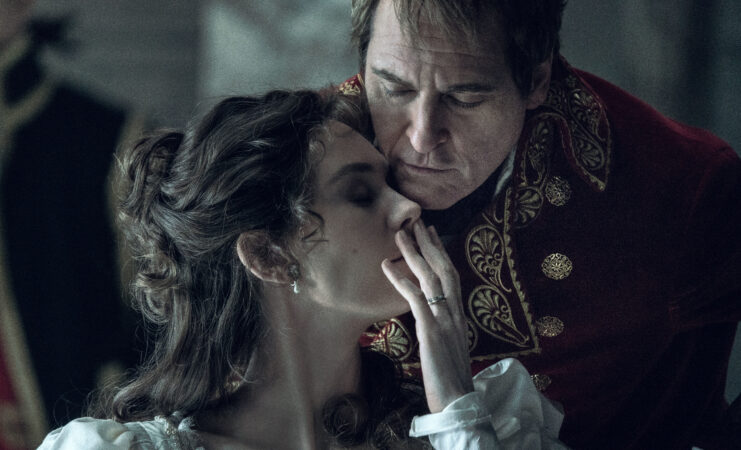
Do you think Napoleon does a disservice to that era in France?
ROXANNE PANCHASI: I think it gives you a picture that has some elements that people can recognize and that historians can also recognize, and having watched it and gone through the letters, it’s a good thing that that’s included.
I think it does a good job at doing what it was setting out to do, but what it sets out to do is not illuminate the historical past or get us thinking more critically about how we use that past in the present. As somebody who’s a French historian, Napoleon’s story isn’t just [about] the French past, it’s something that is continually debated and active in the present in France, and it has political consequences.
How you talk about Napoleon gets caught up in the same way that it’s a question about commemoration. It’s a question about French history. It’s a question about race and Empire and colonialism and all these things. Napoleon is a figure who is really important in the French context and other contexts around the world. What he represents is something very different than what’s in the film.
If you look at a couple of years ago, around the commemoration of Napoleon’s death, the debates that fired up in France around how we should talk about this central historical figure. Is he a hero? Is he something for the French nation to be proud of or is this a shameful part of the French past, from the devastation and death of the Napoleonic Wars to his reestablishment of slavery – how do we think about this figure? Is this somebody we should be ashamed of? Is this somebody who [we] should be really critical of? Is this somebody we should raise up as a hero of the French nation?
Those debates are really interesting to me, and when you look at the film, it does nothing for me to help those debates move in a positive direction.
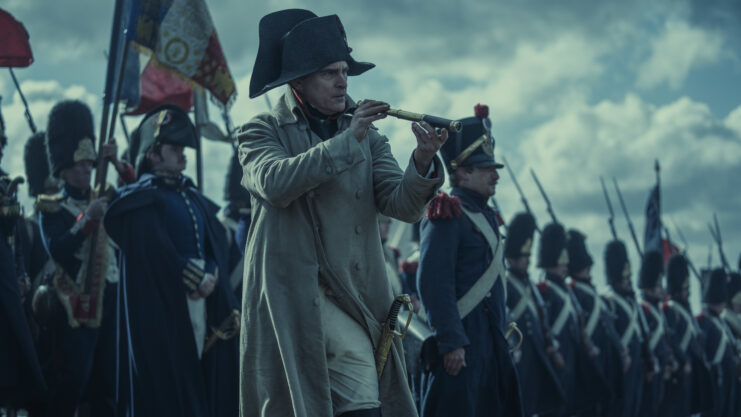
What are your thoughts on the French criticism of the inaccuracies presented in Napoleon?
ROXANNE PANCHASI: It’s been kind of interesting to watch because, on the one hand, people are super excited about this film because it looks like [one] about this important French figure and the world needs to know him for French history. But then you look at the content.
There’s been a lot of anger around the inaccuracies, but it’s not self-critical, a national self-critical anger. It’s not coming from a place of saying, “Hey, we don’t want you trafficking this myth of this hero around the world because we have our own messed up relationship with him and we’re trying to sort this out.” It’s more like, “Hey, this is our history and you got it wrong with this guy because you’re a filmmaker, because you’re not French.”
Is there anything you’d like to add to give audiences a better understanding of what France was like during this period?
ROXANNE PANCHASI: The legacies that remain, let’s engage with those in a meaningful way. For me, the legacies are like a towering myth. The Napoleonic Code – of course, you’re not going to do a brilliant scene about the Napoleonic Code – but what about the Bank of France?
When we think about what Napoleon means in 2023, it’s those long legacies, and, yes, the wars are there. I understand why people are still obsessed with [them], and they were, of course, significant in that moment and they changed Europe and global politics and an empire. But what are the other legacies of the Napoleonic era? What are the other effects of holding a figure like that up as an ideal object, as someone to revere as a hero, as an image of national pride?
More from us: ‘Saving Private Ryan’ Movie Details History Fans Will Appreciate
What are we leaving out when we do that? Whose stories and histories are we forgetting? What violence and perpetration are we overlooking or just not talking about because we can’t deal with it?
